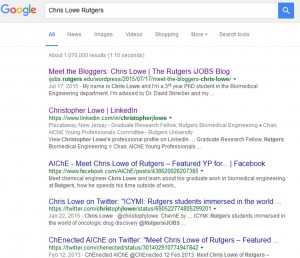By: Chris Lowe
The advice to keep unprofessional or embarrassing pictures from Facebook and Instagram has long been impressed on all of us. But why not take it one step further?
In today’s world, it is inevitable that you’ll be searched for online as you progress through a hiring process. Many of us have probably googled ourselves already. Were you happy with the results? Were you able to find yourself? Since we know there’s a good chance we’ll be searched for, we can take control of what will appear when that happens. Instead of simply removing or obscuring negative content, fill the web with content you do want potential employers to see about you.  This isn’t new advice, but writing for a blog, or creating your own content from scratch for the web to populate a google search, can seem a daunting task. Worse, it could involve a significant investment of time that we don’t have as graduate students and post-docs under pressure. While these are great options to build a personal brand online, they’re not the only way. Taking some first steps and a few minutes each week can help to set you apart with a professional online presence on social media. LinkedIn One place you know employers will be looking for you is LinkedIn. LinkedIn is pretty quick and easy to set up, especially with the resume import feature and the ability to invite your email contacts. If this is all the time you take to set up your account, it’s a good start, but plan to set aside a little time here and there to improve and expand your profile. While industry resumes need to be trimmed to squeeze everything onto one page, your LinkedIn profile can be a detailed repository of all your past experience. This can include a wealth of information including your publications, projects, awards, coursework as well as examples of your work. This is a great chance to have an expanded resume available to the professional community.
This isn’t new advice, but writing for a blog, or creating your own content from scratch for the web to populate a google search, can seem a daunting task. Worse, it could involve a significant investment of time that we don’t have as graduate students and post-docs under pressure. While these are great options to build a personal brand online, they’re not the only way. Taking some first steps and a few minutes each week can help to set you apart with a professional online presence on social media. LinkedIn One place you know employers will be looking for you is LinkedIn. LinkedIn is pretty quick and easy to set up, especially with the resume import feature and the ability to invite your email contacts. If this is all the time you take to set up your account, it’s a good start, but plan to set aside a little time here and there to improve and expand your profile. While industry resumes need to be trimmed to squeeze everything onto one page, your LinkedIn profile can be a detailed repository of all your past experience. This can include a wealth of information including your publications, projects, awards, coursework as well as examples of your work. This is a great chance to have an expanded resume available to the professional community.  Beyond your own profile, there is a wealth of other ways to create a presence for yourself on LinkedIn. Follow companies that you’re interested in to stay abreast of news related to the company that could be useful in an interview. There are groups for all sorts of alumni or special interest groups that often host discussions. By taking part in these discussions with thoughtful responses, you can help to build a reputation for yourself. Additionally, when it does come time to look for jobs, taking a few minutes to set up your search filters can help you zero in on a great job for you. LinkedIn uses your profile content to help identify these job suggestions, so having a clearly detailed profile targeted to jobs you are interested in will help to make these suggestions highly relevant to your future career and may even catch the eye of a hiring manager. Twitter A little over a year ago I created my Twitter handle and I didn’t quite know what to expect. What I found was that Twitter can be a powerful tool to stay current in my field, engage with professional and scientific communities, and it can actually be quite a bit of fun.
Beyond your own profile, there is a wealth of other ways to create a presence for yourself on LinkedIn. Follow companies that you’re interested in to stay abreast of news related to the company that could be useful in an interview. There are groups for all sorts of alumni or special interest groups that often host discussions. By taking part in these discussions with thoughtful responses, you can help to build a reputation for yourself. Additionally, when it does come time to look for jobs, taking a few minutes to set up your search filters can help you zero in on a great job for you. LinkedIn uses your profile content to help identify these job suggestions, so having a clearly detailed profile targeted to jobs you are interested in will help to make these suggestions highly relevant to your future career and may even catch the eye of a hiring manager. Twitter A little over a year ago I created my Twitter handle and I didn’t quite know what to expect. What I found was that Twitter can be a powerful tool to stay current in my field, engage with professional and scientific communities, and it can actually be quite a bit of fun.  With a Twitter account, you can follow companies you’re interested in (@JNJNews, @Merck), major government agencies in your field (@NIH, @NSF), and stay up to date with the latest news (@statnews). Retweet and share stories you find from other accounts to help paint a picture of your interests and what’s important to you. You can also craft your own tweets to share your opinions, contribute to a conversation, or present interesting articles or information you’ve come across. There’s no reason you can’t share your accomplishments either! Many journals have a Twitter presence and frequently retweet authors whom they have recently published (@PLOS, @ACSPublications). This can allow you to get your new paper out there and noticed by an even broader audience. Not only can it be a useful tool, but engaging on Twitter can actually be quite a bit of fun. It’s cool to see things you’ve tweeted get retweeted or favorited by other people all across the globe. These are just a few quick, beginner tips to help build professional content for yourself on the internet. This will make it easier for future employers to find you and for you to control what it is they are seeing about you. In the past we’ve had a couple of other posts on the iJOBS blog which discuss how you can use social media to your advantage in professional realms and those can be found here: Using Social Media to Your Advantage During the Job Hunt – By: Ina Nikolaeva Professional Networking: How to Advance Your Career Using Social Media – By: Itzamarie Chevere-Torres
With a Twitter account, you can follow companies you’re interested in (@JNJNews, @Merck), major government agencies in your field (@NIH, @NSF), and stay up to date with the latest news (@statnews). Retweet and share stories you find from other accounts to help paint a picture of your interests and what’s important to you. You can also craft your own tweets to share your opinions, contribute to a conversation, or present interesting articles or information you’ve come across. There’s no reason you can’t share your accomplishments either! Many journals have a Twitter presence and frequently retweet authors whom they have recently published (@PLOS, @ACSPublications). This can allow you to get your new paper out there and noticed by an even broader audience. Not only can it be a useful tool, but engaging on Twitter can actually be quite a bit of fun. It’s cool to see things you’ve tweeted get retweeted or favorited by other people all across the globe. These are just a few quick, beginner tips to help build professional content for yourself on the internet. This will make it easier for future employers to find you and for you to control what it is they are seeing about you. In the past we’ve had a couple of other posts on the iJOBS blog which discuss how you can use social media to your advantage in professional realms and those can be found here: Using Social Media to Your Advantage During the Job Hunt – By: Ina Nikolaeva Professional Networking: How to Advance Your Career Using Social Media – By: Itzamarie Chevere-Torres